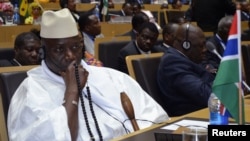Gambians Monday celebrate the 48th independence anniversary of their country from the United Kingdom.
President Yahya Jammeh declared Friday and Sunday as national days of prayer for continued peace, progress, security, harmony and stability in the country.
But, opposition leader Ousainu Darbo of the United Democratic Party said Gambians have nothing to celebrate because Jammeh has failed to improve the lives of ordinary Gambians.
He said Gambians have been subjected to abject poverty and a lack of freedom under 19 years of Jammeh’s rule.
“Nothing has happened that improves the lives of the ordinary citizens. In fact, we are declining in abject poverty day by day. There is hunger to the extent that the majority of families live on one meal a day and yet the government is spending on matters that do not impact positively on the lives of the ordinary people,” he said.
Darbo criticized the government for declaring three days of national holiday to celebrate the anniversary without regard for the impact on the country’s economy.
“Can you imagine a whole week where people go to work just for pay day? Wednesday and Thursday, those will be the only working days in the country. The negative impact that will have on the economy is one that this government doesn’t care about,” Darbo said.
He called on Gambians to revisit the founding fathers’ vision of an independent Gambia and rededicate themselves to that vision.
“There is nothing for Gambians to celebrate. But, there is something for them to do; that is, to rededicate ourselves to the service of this country, and also take [the] decision that, in 2016, we will get rid of this wasteful government,” he said.
Gambia currently has seven political parties, including the ruling Alliance for Patriotic Reorientation and Construction, or APRC. But, Darbo said political freedom should be the measure of multi-party democracy and not the number of political parties a country has.
“Multi-party democracy is evidence not by the number of political parties, but by the freedom of the political parties to engage in their political activities, their access to the national media, and the lack of intimidation. These are the things that one would look for in a country where there is multi-party democracy,” Darbo said.
In January, Amnesty International wrote Jammeh to criticize “a series of abuses by the National Intelligence Agency against Gambian journalist Abdoulie John in recent months.”
Darbo said Gambians do not have access to independent newspapers through which they can express their views.
“You will probably know that two independent newspapers have been closed down, an independent radio station has also been closed down. There is only one newspaper, the Daily Observer, which serves the ruling party. The multiplicity of papers that we used to have and the opportunity of expressing views in the media is no longer in existence,” Darbo said.
President Yahya Jammeh declared Friday and Sunday as national days of prayer for continued peace, progress, security, harmony and stability in the country.
But, opposition leader Ousainu Darbo of the United Democratic Party said Gambians have nothing to celebrate because Jammeh has failed to improve the lives of ordinary Gambians.
He said Gambians have been subjected to abject poverty and a lack of freedom under 19 years of Jammeh’s rule.
“Nothing has happened that improves the lives of the ordinary citizens. In fact, we are declining in abject poverty day by day. There is hunger to the extent that the majority of families live on one meal a day and yet the government is spending on matters that do not impact positively on the lives of the ordinary people,” he said.
Darbo criticized the government for declaring three days of national holiday to celebrate the anniversary without regard for the impact on the country’s economy.
“Can you imagine a whole week where people go to work just for pay day? Wednesday and Thursday, those will be the only working days in the country. The negative impact that will have on the economy is one that this government doesn’t care about,” Darbo said.
He called on Gambians to revisit the founding fathers’ vision of an independent Gambia and rededicate themselves to that vision.
“There is nothing for Gambians to celebrate. But, there is something for them to do; that is, to rededicate ourselves to the service of this country, and also take [the] decision that, in 2016, we will get rid of this wasteful government,” he said.
Gambia currently has seven political parties, including the ruling Alliance for Patriotic Reorientation and Construction, or APRC. But, Darbo said political freedom should be the measure of multi-party democracy and not the number of political parties a country has.
“Multi-party democracy is evidence not by the number of political parties, but by the freedom of the political parties to engage in their political activities, their access to the national media, and the lack of intimidation. These are the things that one would look for in a country where there is multi-party democracy,” Darbo said.
In January, Amnesty International wrote Jammeh to criticize “a series of abuses by the National Intelligence Agency against Gambian journalist Abdoulie John in recent months.”
Darbo said Gambians do not have access to independent newspapers through which they can express their views.
“You will probably know that two independent newspapers have been closed down, an independent radio station has also been closed down. There is only one newspaper, the Daily Observer, which serves the ruling party. The multiplicity of papers that we used to have and the opportunity of expressing views in the media is no longer in existence,” Darbo said.













